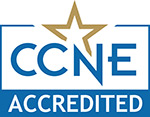Online Nursing Education
Online Master's Degree in Nursing Education
The Master of Science in Nursing-Nursing Education specialty track is designed to expand the knowledge of the registered nurse to include the design, implementation, and evaluation of nursing education. The focus on evidence-based practice, quality outcomes, clinical expertise, educational principles, and advancement of the individual nurse and profession will prepare the registered nurse for an advanced level of practice. Students complete a total of 120 practicum hours with 60 hours with a nurse educator in their community and 60 hours with a direct-care provider in their community.
Program Overview
The Master of Science in Nursing-Nursing Education specialty track is designed to expand the knowledge of the registered nurse to include the design, implementation, and evaluation of nursing education. The focus on evidence-based practice, quality outcomes, clinical expertise, educational principles, and advancement of the individual nurse and profession will prepare the registered nurse for an advanced level of practice. Students complete a total of 120 practicum hours, with 60 hours with a nurse educator in their community and 60 hours with a direct-care provider in their community.
This program does not lead to additional licensure or certification. As such, CTU has made no determination regarding prerequisites for licensure or certification in any state or jurisdiction.
College of Nursing Mission Statement
Through an innovative curriculum and student-centered teaching, the nursing faculty teaches, supports, and inspires students to become competent, caring, and accountable professionals who serve a diverse client population within a dynamic health care environment.
MSN Program Goals
- Employ leadership skills to improve the quality of care in a variety of healthcare settings
- Integrate advanced nursing and science knowledge into practice
For the eighth consecutive year, CTU’s online Master of Science in Nursing degree programs are ranked among the Best Online Master's in Nursing Programs by U.S. News and World Report.* For the first time, CTU's online Master of Science in Nursing degree programs are ranked among the Best Online Master's in Nursing Programs for Veterans by U.S. News and World Report.*
* CTU programs are ranked among U.S. News & World Report’s 2024 Best Online Programs.

The Master of Science in Nursing degree program at Colorado Technical University is accredited by the Commission on Collegiate Nursing Education, 655 K Street NW, Suite 750, Washington, DC 20001, 202-887-6791.
Estimate your costs, potential savings and graduation date
Courses
| Courses-Core | Credits | |
|---|---|---|
| NRSG610 | Advanced Nursing Practice | 4 |
| NRSG612 | Integrating Theory and Research for Evidence-Based Practice | 4 |
| NRSG615 | Healthcare Informatics and Technologies | 4 |
| NRSG617 | Policy and Politics in Nursing and Healthcare | 4 |
| NRSG625 | Promoting and Preserving Health in a Diverse Society | 4 |
| NRSG640 | MSN Capstone | 4 |
| Total Credit Hours: | 24 | |
| Courses-Concentration | Credits | |
|---|---|---|
| NRSG631 | Advanced Pathopharmacology & Physical Assessment for the Nurse Educator A | 2 |
| NRSG631 | Advanced Pathopharmacology & Physical Assessment for the Nurse Educator B | 2 |
| NRSG633 | Innovative Teaching Strategies | 4 |
| NRSG634 | Curriculum Development and Design | 4 |
| NRSG635 | Assessment and Evaluation Strategies | 4 |
| NRSG636 | Applying Nursing Education Principles in Practice & Virtual Environments | 4 |
| NRSG637 | Application of QSEN in the Advanced Nursing Role | 4 |
| Total Credit Hours: | 24 | |
Total Credit Hours: 48
Learning Outcomes
MSN Program Learning Outcomes:
- Synthesize knowledge from nursing and a variety of sciences in diverse settings for the purpose of improving nursing care
- Apply organizational and systems leadership concepts to promote quality patient care
- Evaluate performance improvement processes designed for the purpose of providing quality patient care
- Apply research outcomes and evidence-based practice to recommendations for improved patient care
- Synthesize health policy processes established for the advocacy of quality healthcare
- Integrate interprofessional collaboration to the management of patient and population health outcomes
- Apply organizational, client-centered, and culturally appropriate concepts to clinical prevention and population care to identified populations
MSN - Nursing Education Concentration Learning Outcomes:
- Utilize pedagogical principles to develop, design, and revise an innovative nursing curriculum that promotes quality and safety in the delivery of nursing care and education.
- Critique curricular assessment and evaluation strategies to ensure optimal learner outcomes are achieved.
- Demonstrate clinical expertise through the synthesis of evidence from nursing and other sciences in preparation and delivery of nursing education to a diverse population of learners.
Faculty

Dr. Rose Nieves
University DeanDr. Rose Nieves is the Dean of the College of Nursing for Colorado Technical University. In this role, she leverages her vast experience as a nursing leader, educator and healthcare provider to help assess, mold, develop and direct the College of Nursing.

Dr. Phaedra Walker
Executive Program DirectorDr. Phaedra Walker is the Executive Program Director of Nursing and Health Studies at Colorado Technical University. Dr. Walker is a board-certified Advanced Practice Registered Nurse, Family Nurse Practitioner with more than 25 years of experience in the nursing profession.
For more faculty profiles please visit our Leadership and Faculty page.
For more information visit the College of Nursing.
Admission Requirements
Admissions Requirements
Admission to this program requires an active, clear, and unencumbered license to practice as a Registered Nurse (RN) in the United States. All students must maintain this licensure throughout the program of study.
Students must have graduated with a Bachelor of Science in Nursing (BSN) degree from an institutionally accredited institution. A cumulative grade point average (CGPA) of 3.0 for the last 90 quarter (60 semester) hours of study undertaken for full acceptance into the program.
Prior to starting the nursing program all applicants must submit an unofficial or official copy of college transcript from their BSN degree for review. Applicants to the Master of Science in Nursing degree program who meet all general admission requirements, but who have a CGPA for the BSN degree between 2.75 to 2.99 for the last 90 quarter (60 semester) hours of study, may be granted provisional admission. Students must successfully complete their first two MSN courses with a minimum of 3.0 GPA to be granted full admission to the nursing program or be administratively withdrawn.
Students must successfully complete NRSG610 first before advancing to other courses in the MSN program. No other program courses may be taken prior to NRSG610.
At this time, Colorado Technical University cannot accept inquiries for the MSN-NE program from residents of the states of Alabama, Alaska, Delaware, Louisiana, Massachusetts, Minnesota, New Hampshire, New York, Tennessee, Washington, and West Virginia.
Related Degrees
Compare up to three additional degrees
FAQs
In this Master of Science in Nursing (MSN) degree program, candidates study program core and nursing concentration courses, including but not limited to, Integrating Theory and Research for Evidence-Based Practice, Policy and Politics in Nursing and Healthcare, Advanced Pathopharmacology & Physical Assessment for the Nurse Educator, and Curriculum Development and Design.
In the Nursing Education (MSN-NE) concentration, candidates will explore nursing education principles such as the use of innovative teaching strategies, curriculum design and development, assessment and evaluation, and the application of these concepts in nursing practice and virtual environments.
Candidates will participate in practicum experiences (immersion experiences) under the direct supervision of a preceptor. Students in the MSN-NE are required to participate in two practicum courses, 60 hours each, for 120 hours total. Students may be able to complete their practicum with their place of employment (if appropriate). Students may not complete practicum hours in their current department or with in-line supervisors.
This MSN degree program is offered online and starts every 5 weeks. For more information, you can speak to an Admissions Advisor over the phone (1-855-230-0555) or request it online. Once you’ve completed the online request, you can expect to hear from an advisor within 24 hours to answer any questions you may have and to discuss the next steps toward starting your degree program.
This Master of Science in Nursing (MSN) degree program is comprised of 48 credit hours. Candidates may be eligible for transfer credit, which is evaluated on an individual basis. Not all credits are eligible for transfer. See the University Catalog for transfer credit policies.
At CTU, our nursing courses are built around our proprietary intellipath® learning system, an adaptive learning technology that recognizes what candidates already know, anticipates what they’re ready to learn, and tailors the course materials accordingly so they can move quickly over the content they already know. This technology is similar to the computerized adaptive testing nurses use for entrance to the profession.
The structure of the MSN-Nursing Education and MSN-Nursing Administration concentrations are designed to allow the working nurse to advance in his/her MSN degree while continuing to work within the community. We provide registered nurses the flexibility to attend classes while working with 100% online courses and access to our handy mobile app. There is no waitlist, no GMAT/GRE, and MSN-NE learners may be able to complete their practicum hours within their local community.
Yes, The Bachelor of Science in Nursing degree, Master of Science in Nursing degree, Post Graduate APRN Certificate – Family Nurse Practitioner, and Doctor of Nursing Practice degree programs at Colorado Technical University are accredited by the Commission on Collegiate Nursing Education (http://www.ccneaccreditation.org).
Information about the practicum requirements can be found in the Nursing Learning Center where the Master of Science in Nursing Practicum Guide is located. The Clinical Coordinator also partners with students to assist with practicum related questions.
Students must disclose if they are requesting to do their practicum with their employer. Students may not complete practicum hours in their current department or with in-line supervisors.
To speak with an advisor, request information here.
What Students Are Saying About Their CTU Experience
It's been a personal goal of mine to further my skills and advance in my career. CTU offered the flexibility and structure that worked with my current job and family life.
Jeniffer H. 2022 Graduate, Master of Science in Nursing
The most rewarding part of earning my degree is the development of thought, communication, and behavior. I have noticed a change in how I care for patients which is more refined.
Leigh F. 2023 Graduate, Master of Science in Nursing
CTU offered convenient online education that fit into my full-time work schedule.
JuliAnne M. 2023 Graduate, Master of Science in Nursing
